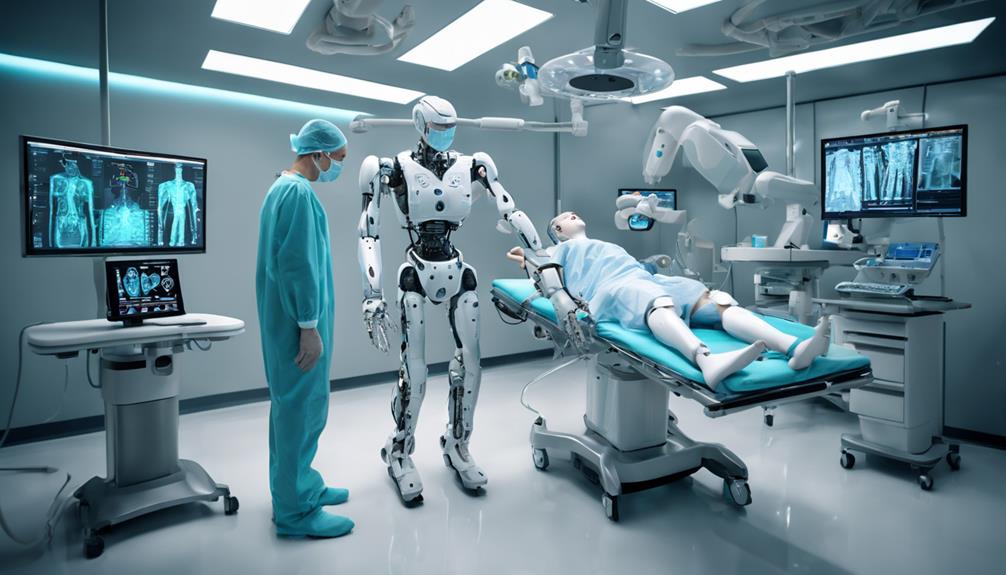
You're likely wondering who dominates the AI landscape, and it's none other than tech behemoths like Google and Microsoft. Both companies are at the forefront, pushing boundaries with their extensive research departments and massive patent portfolios. They're not just innovating but also shaping how AI integrates across different sectors, including healthcare, finance, and retail. With their resources, Google and Microsoft significantly influence AI development and the setting of ethical standards. Exploring more about how these companies and others are competing might surprise you with some of the lesser-known but pivotal players in the AI arena.
Defining AI Dominance

What does it mean to dominate in the field of AI?
You're looking at a combination of innovation, influence, and market control. Dominance isn't just about having the most sophisticated technology; it's about setting the pace for AI development and application worldwide. You've got to be a trendsetter in research, pushing boundaries that others will follow.
Dominating in AI also means your products and services are widespread, integrated into numerous industries and everyday applications.
It's about having the power to shape how AI is perceived and used across the globe. If you're a company at the forefront, you're not only leading in terms of sales figures but also in terms of setting standards and ethical guidelines that others in the industry adopt.
Moreover, dominance involves an extensive patent portfolio and a robust research department that consistently fuels innovation.
You're influencing future technologies by steering investments and partnerships that prioritize sustainable and ethical AI development. It's about being a thought leader, where your strategies and outlook on AI's future are benchmarks for the industry.
Historical Leaders in AI
Throughout history, several key players have shaped the landscape of artificial intelligence, setting foundational precedents for today's advancements.
You've probably heard of Alan Turing, haven't you? He's often called the father of theoretical computer science and AI. Back in the 1950s, his work laid the groundwork for what you now recognize as AI.
Then there's Marvin Minsky at MIT, another giant. He co-founded the MIT AI laboratory in 1959 and pushed forward the idea that machines could eventually simulate human cognition.
You can't overlook John McCarthy, either. He actually coined the term 'artificial intelligence' and organized the famous Dartmouth Conference in 1956, where the term was first adopted and the initial AI research agenda was set.
You should also know about Geoffrey Hinton, who later led breakthroughs in neural networks. His work in the 1980s and 1990s on deep learning techniques revolutionized machine learning, paving the way for many of the AI applications you use today.
These pioneers didn't just build algorithms or write academic papers; they envisioned a world where machines could assist and enhance human capabilities. Their visions and technical breakthroughs have directly influenced the sophisticated AI technologies you now see integrated into everyday life.
Current Market Overview

Building on the foundation set by historical leaders, today's AI market is dominated by major tech companies that continue to innovate and expand the technology's reach. You'll find that giants like Google, Microsoft, Amazon, and IBM are at the forefront, each pushing the boundaries of what AI can achieve in various sectors. They're not just enhancing their products but are also deeply involved in services that integrate AI solutions for both enterprises and consumers.
As you look closer, you'll see a trend where these companies are increasingly leveraging AI to gain competitive advantages. This includes improving user experience, automating processes, and creating new business models that can profoundly change industries. They're focusing on areas such as healthcare, finance, automotive, and retail, where AI can be particularly transformative.
Moreover, the rise of cloud computing has played a crucial role in this scenario. It's enabling faster and more efficient deployment of AI technologies, making them more accessible to a broader range of businesses. This democratization of AI is crucial as it allows smaller players to enter the market and collaborate with larger firms, stirring up competition and innovation.
This dynamic landscape shows no signs of slowing down as AI continues to be a critical area of growth.
Key Innovations and Patents
In the realm of AI, major tech companies hold numerous patents on game-changing innovations. These patents aren't just pieces of paper; they're the bedrock of technological dominance, ensuring that these companies stay at the forefront of AI development.
You've likely heard about deep learning and neural networks, but the intricacies of these patents show just how deep the rabbit hole goes.
For instance, consider the patent on machine learning techniques that adapt based on real-time data. This isn't just smart; it's revolutionary, allowing AI systems to evolve and improve without human intervention. You're looking at technology that learns similarly to how you do, by integrating new information and adjusting accordingly.
Another groundbreaking patent involves natural language processing (NLP). This technology enables machines to understand and respond to human language in a way that feels incredibly natural. It's the tech behind your favorite voice-activated assistants and customer service chatbots.
These innovations are crucial because they set the stage for further advancements. Each patent is a stepping stone that might lead to the next big breakthrough in AI technology, transforming how you interact with technology on a daily basis.
Investment Trends in AI

You've seen the patents; now let's delve into how billions are being funneled into AI development.
Investment in AI isn't just growing; it's exploding. In recent years, you've witnessed a significant uptick in both private and public sector funding. Venture capitalists, enamored with the potential of AI, are pouring unprecedented capital into startups that push AI boundaries. You're seeing these companies transform from obscure entities into major players, thanks to robust financial backing.
Governments aren't lagging behind. They're recognizing the strategic importance of AI and are opening their coffers, aiming to secure a lead in this technological race. This investment isn't only about economic gains; it's a bid to enhance national security and global competitiveness. For instance, national AI research institutes are being established, often backed by substantial government grants and incentives.
You're also seeing a surge in cross-border investments. Countries and corporations are increasingly collaborating, pooling resources to accelerate AI development. This trend isn't just about enhancing individual prowess but also about forging strong international partnerships that can lead to shared technological advancements.
AI in Consumer Technology
AI's integration into consumer technology is reshaping how you interact with your devices daily. It's now commonplace for you to speak to your phone, ask your home assistant for the weather, or get shopping recommendations from your favorite online store, all powered by AI. This isn't just about convenience; it's transforming your lifestyle and how you manage your time.
Your smartphone now uses AI to optimize battery life and manage app usage more efficiently than ever before. When you take photos, AI helps in enhancing images automatically, recognizing faces, and even suggesting the best frame. Your experiences are becoming more personalized.
Streaming services analyze your watching habits and suggest movies and shows that you're likely to enjoy, making it easier for you to find your next binge-watch without sifting through endless options.
Even your home is getting smarter. AI-powered thermostats learn your preferences and adjust the temperature automatically, saving energy while keeping you comfortable. Smart fridges can keep track of your groceries, suggest recipes based on what's inside, and alert you when you're running low on essentials.
You're living in a world where technology anticipates your needs, making daily tasks simpler and more enjoyable.
AI Impact on Healthcare

AI is revolutionizing healthcare by enhancing diagnostic accuracy and personalizing treatment plans. As you explore the landscape of modern medicine, you'll notice that AI's role is pivotal in analyzing vast amounts of data to identify patterns that humans can't easily detect. This capability is particularly transformative in fields like oncology, where AI algorithms help to pinpoint the most effective treatment strategies for individual cancer patients, considering their unique genetic makeup.
You're also seeing AI streamline administrative processes in hospitals. It's reducing the burden on healthcare professionals by automating routine tasks like scheduling and patient data management, allowing them more time to focus on patient care.
Furthermore, AI supports the development of next-generation medical devices that monitor and predict health issues before they become critical, directly contributing to preventative medicine.
AI's influence extends to enhancing the speed and precision of medical research. It's accelerating the discovery of new drugs by simulating their effects on the human body digitally, drastically cutting down the time and cost traditionally required for clinical trials.
In every corner of healthcare, AI isn't just an assistant; it's becoming a backbone, reshaping how you receive care and significantly improving outcomes.
AI Advancements in Robotics
While AI reshapes healthcare, its advancements in robotics are equally transformative, enhancing automation and efficiency across various industries. You've likely noticed how robots equipped with AI are becoming integral in manufacturing, where they perform tasks with unprecedented precision and speed. This isn't just about replacing repetitive human labor; it's about augmenting capabilities to achieve more with less.
Consider the automotive industry. You're seeing robots that can't only assemble parts but also inspect their own work for defects using AI-driven vision systems. This dual role reduces errors and increases production rates, which in turn lowers costs and boosts product quality.
In agriculture, AI-powered robots are revolutionizing how you grow and harvest crops. These robots can analyze soil conditions and plant health, making decisions on when to water or apply nutrients. This smart farming technique maximizes yield and minimizes waste, making it a game changer for the industry.
Even in the service sector, AI robots are making an impact. They're being deployed in warehouses to pick and pack orders, and in retail, they assist with inventory management. These advancements aren't just futuristic—they're here, making operations smoother and more adaptable to changing demands.
Government and AI Regulations

Governments around the world are taking steps to regulate the use of AI technology, emphasizing responsible and ethical practices. This global response reflects a recognition of both the risks and benefits associated with AI, with a focus not only on preventing harm but also on fostering innovation within a controlled framework.
In the U.S., efforts are underway to develop frameworks addressing key issues such as privacy, security, and transparency in AI systems. There is a growing emphasis on the auditability and explainability of AI processes to prevent them from operating as opaque "black boxes." Meanwhile, in Europe, the GDPR has laid the groundwork for regulating how AI handles personal data, with new regulations being proposed to specifically target AI, highlighting the importance of accountability and human oversight.
In Asia, countries like China and Japan are also implementing their own regulatory measures. China is prioritizing state control and ethical standards in AI development, while Japan is integrating AI technologies with societal values.
It is essential to recognize the impact of these regulations on the use of AI technology. These regulations go beyond mere guidelines, shaping the design and implementation of AI systems to ensure they are in line with broader societal values and security considerations. Understanding these regulatory frameworks is crucial for navigating the evolving landscape of AI technology.
Predicting Future AI Leaders
You'll find that predicting the future leaders in AI hinges on identifying which companies and countries invest heavily in innovation and regulatory compliance. These factors aren't just buzzwords; they're critical indicators of who's gearing up to dominate the AI landscape.
Look at the tech giants and startups alike. Companies pouring resources into R&D, securing patents, and actively engaging in global AI forums are laying the groundwork for future dominance.
Consider the role of government too. Nations that create favorable environments for AI development through supportive policies and substantial funding are positioning themselves as future leaders. Countries leading in AI regulation and ethics, such as those in the European Union, are likely to attract innovative companies and top talent, further solidifying their lead.
It's crucial to monitor who's making strategic alliances and acquisitions in the AI field. These moves often signal a company's ambition and financial strength, crucial for sustained investment in cutting-edge AI technologies.
Frequently Asked Questions
How Does AI Influence Daily Personal Routines?
AI shapes your daily routines by optimizing tasks, offering personalized suggestions, and automating mundane activities. It learns your preferences to enhance efficiency, making your day smoother and more productive.
Can AI Improve Emotional Well-Being?
Yes, AI can improve your emotional well-being by offering personalized mental health support and enhancing your self-awareness through apps that monitor mood and provide coping strategies tailored to your emotional state.
What AI Jobs Will Exist in 2030?
You'll see new AI roles in 2030, like AI ethicists, data bias auditors, and human-AI interaction designers, all crucial as technology evolves and integrates more deeply into everyday life and various industries.
How Does AI Affect Children's Education?
AI impacts your child's education by personalizing learning and improving engagement. It identifies strengths and weaknesses, offering tailored support, making education more accessible and interactive, thus potentially enhancing learning outcomes.
What Are Ethical Concerns Regarding AI in Surveillance?
You're facing ethical concerns about AI in surveillance, including privacy violations, biased monitoring, and lack of consent. These issues can lead to significant societal and personal consequences if not carefully managed and regulated.
Conclusion
As you've seen, the landscape of AI is vast and ever-evolving. Companies like Google, IBM, and Microsoft continue to lead with groundbreaking innovations and hefty investments.
In healthcare and robotics, AI's impact is profoundly transformative, pushing boundaries further. With governments stepping up regulations, the future of AI remains robust but uncertain.
Keep an eye on these players and trends; they're not just shaping the future of technology but redefining how you'll interact with the world.






